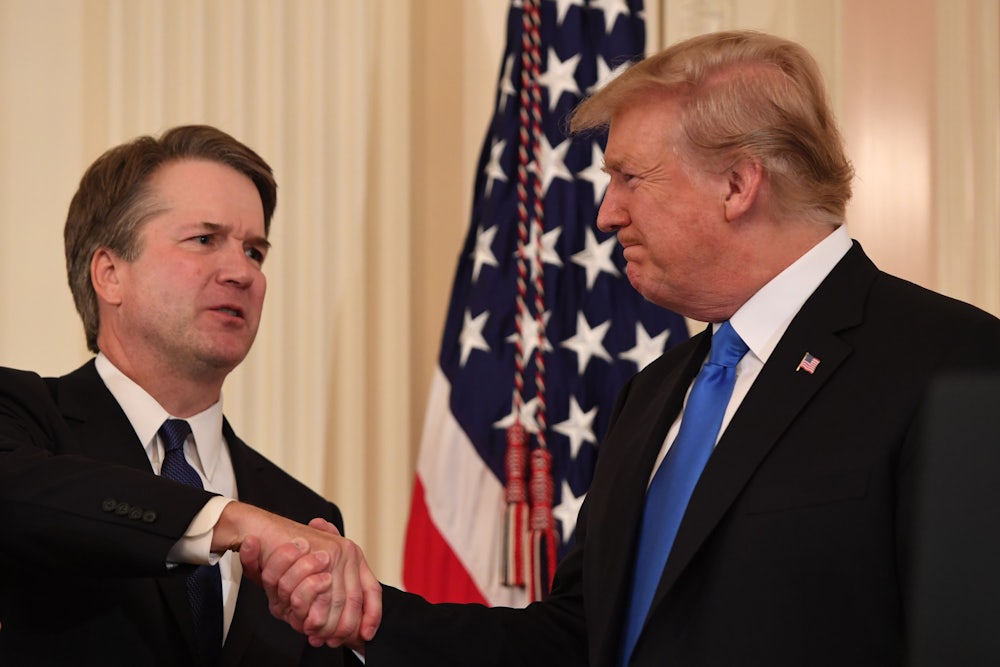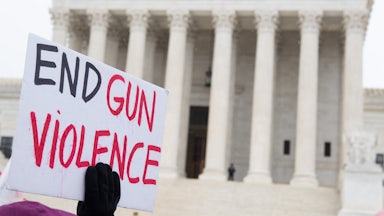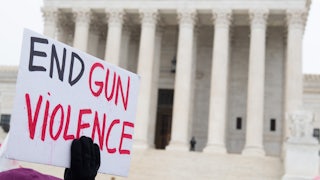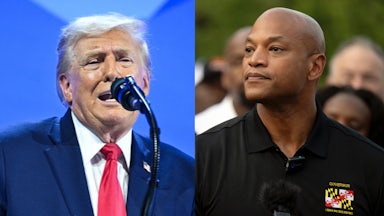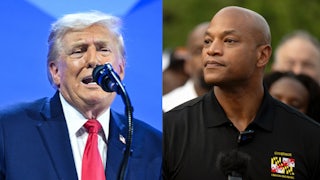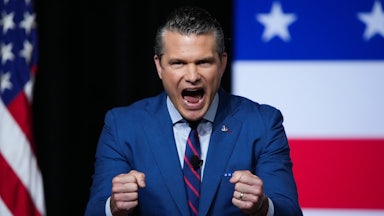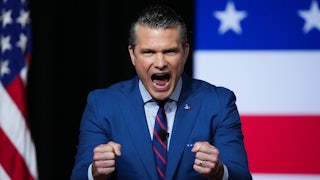Justice Brett Kavanaugh does not work for the Trump Justice Department or the White House’s Office of Legal Counsel. Yet he helped them out quite a bit last month when, in an unrelated case, he effectively argued against using one of the Supreme Court’s most prominent doctrines to limit the president’s ability to impose tariffs at will on other countries.
In FCC v. Consumers’ Research, Kavanaugh opined in a concurring opinion that the major-questions doctrine—a tool used by the court to strike down a wide range of significant policies under the Biden administration—does not carry as much weight when a president is acting on national security or foreign policy grounds.
“The canon does not translate to those contexts because of the nature of presidential decisionmaking in response to ever-changing national security threats and diplomatic challenges,” he wrote.
The Justice Department happily cited Kavanaugh’s opinion in a filing before the Federal Circuit Court of Appeals earlier this week. The U.S. Court of International Trade ruled in May that Trump’s use of the International Emergency Economic Powers Act, or IEEPA, to impose onerous tariffs on imports with little to no warning went beyond what Congress had authorized under both the major-questions doctrine and a related one known as the nondelegation doctrine. (More on the latter doctrine later.)
“Plaintiffs invoke the major-questions doctrine, but it is inapposite here,” the department claimed, referring to the companies and states challenging the tariffs. “The delegation here is to the president, not an agency; the president’s exercise of power under IEEPA is not a novel invocation of an apparently narrow statute; and it is particularly inappropriate to construe narrowly a delegation in the arena of foreign affairs and national security, where the President’s expertise and independent constitutional authority are at their apex.”
The government’s sole citation for this point was Kavanaugh’s concurring opinion. That opinion is not binding on lower courts, and it does not necessarily reflect the views of the other eight Supreme Court justices, all of whom declined to join it last month. Even so, it shows how the relationship between Trump and the Supreme Court is increasingly more collaborative than confrontational, even in the face of acts that appear to be illegal, unconstitutional, or both.
The Consumers’ Research case in which Kavanaugh wrote centered a legal challenge to the Universal Service Fund. Congress established the fund under the Federal Communication Commission’s authority in 1996 to provide telecommunications access to low-income and rural Americans who might otherwise be underserved by market forces. By law, every telecom company in America contributes to the fund.
The FCC, which supervises the fund, permanently transferred day-to-day control of it to the Universal Service Administrative Company. Justice Elena Kagan described the company as a “private, not-for-profit corporation” in her majority opinion. In addition to its administrative functions, the company helps the FCC determine the rate at which telecom companies must contribute to the fund. After announcing the new rate for 2022 four years ago, Consumers’ Research sued to overturn the funding scheme under the nondelegation doctrine.
In its most basic form, the nondelegation doctrine holds that one branch of the federal government cannot permanently or unconditionally transfer its core powers to another branch of the government. This is a logical outgrowth of the Constitution’s separation of powers: Congress could not, for example, pass a law that automatically approved all of the president’s Cabinet and judicial nominations without individual votes.
At the same time, basic governance requires that Congress give a certain amount of latitude to the executive branch and the judiciary when interpreting and applying federal laws. Good government relies on discretion when faced with unusual circumstances and adaptability when dealing with new situations. To that end, the Supreme Court has long held that the nondelegation doctrine does not kick in so long as Congress—and it is almost always Congress at issue here—provides an “intelligible principle” to guide an agency like the FCC when exercising power delegated to it by the legislature.
Not everyone is happy with that framework. Consumers’ Research is a right-wing group that shambles around Washington, D.C., in the skin of a defunct consumer-protection organization, much like Buffalo Bill from Silence of the Lambs. In its lawsuit, the group argued that the twin delegations—from Congress to the FCC, and then from the FCC to USAC—went too far, even if both were acceptable on their own. To no one’s surprise, that argument received a favorable reception from the right-wing Fifth Circuit Court of Appeals, which held that the funding scheme was unconstitutional.
The Supreme Court disagreed. Kagan, writing for the 6–3 court, drew the opposite conclusion from the interplay between the two delegations at issue. Since each of them were constitutional on their own, she reasoned, the plaintiffs could not defeat them by arguing that they were somehow unconstitutional together. “Contra the Fifth Circuit, a meritless public nondelegation challenge plus a meritless private nondelegation challenge cannot equal a meritorious ‘combination’ claim,” Kagan explained.
In his concurring opinion, Kavanaugh agreed with the majority opinion in full. He wrote separately to give a more comprehensive view on how the nondelegation doctrine applied to modern American governance. Notably, Kavanaugh wrote in favor of the “intelligible principle” test from a conservative perspective—a break of sorts with some originalists who want it scrapped in favor of a tougher standard.
His rationale was a largely pragmatic one: The test has had “staying power” over the past century in part “because of the difficulty of agreeing on a workable and constitutionally principled alternative,” and in part because a “stricter test” could “diminish the president’s longstanding Article II authority to implement legislation.” Though the justices theoretically write for any American to read and understand, Kavanaugh was apparently speaking to his fellow travelers in the conservative legal movement.
The intelligible principle test, he noted at one point, was “accepted and applied over the years by Justice [Antonin] Scalia, Chief Justice [William] Rehnquist, and Chief Justice [William Howard] Taft,” whom he described as three jurists with executive branch experience who “deeply appreciated the risks of undue judicial interference with the operations of the presidency.” This sort of judicial name-checking is weird and unpersuasive in a formal opinion because the argument itself, not the person making it, is what actually matters. Only if you’re trying to persuade your fellow guests at the next Federalist Society gala that this decision is a defensibly conservative one do the other justices’ identities matter.
Kavanaugh also opined that there was not as much need for a rigid test because the Supreme Court had other tools to use to enforce the separation of powers. He pointed to the demise of the Chevron doctrine last summer and the rise of the major-questions doctrine as evidence that “many of the broader structural concerns about expansive delegations have been substantially mitigated.” The court’s conservative majority, in other words, has plenty of finer-wrought weapons to wield against disfavored regulations and policies without relying upon the blunt instrument of nondelegation.
As part of this throat-clearing exercise, Kavanaugh then offered a limiting principle to the major-questions doctrine. That doctrine generally holds that Congress must “speak clearly” when authorizing federal agencies to regulate on matters of “vast economic and political significance.” The doctrine’s vague phrasing, combined with Congress’s habit of legislating in broad terms, effectively gives the court a freewheeling veto over policies it doesn’t like. To that end, the six conservative justices have used it in recent years to quash all manner of policies from Democratic presidents, from the provision of student-loan debt relief to the regulation of carbon emissions from power plants.
I emphasize that the major-questions doctrine applies to “policies from Democratic presidents” because it has yet to be used to strike down a Republican president’s policies. Trump’s tariffs seemed like the best opportunity for the court’s conservatives to demonstrate some intellectual consistency. IEEPA’s relevant text does not mention tariffs by name at all. The government argues that the power to “regulate ... importation” works the same, but the “vast economic and political significance” of that question should counsel against adopting that interpretation, right? Not so, says Kavanaugh, because of national security reasons:
“In addition, the major questions canon has not been applied by this court in the national security or foreign policy contexts, because the canon does not reflect ordinary congressional intent in those areas,” he wrote. “On the contrary, the usual understanding is that Congress intends to give the president substantial authority and flexibility to protect America and the American people—and that Congress specifies limits on the President when it wants to restrict presidential power in those national security and foreign policy domains.”
This is an extremely helpful interpretation for the Trump administration, which has often relied on dubious claims of national security threats to advance its trade policy. When Trump imposed tariffs on steel imports from Canada at one point during his first term, for example, former Canadian Prime Minister Justin Trudeau asked the president in a telephone call what national security rationale could possibly justify them. “Didn’t you guys burn down the White House?” Trump reportedly replied, an apparent reference to the War of 1812.
Some observers noted that this was not technically correct: It was British soldiers who burned down Washington in 1814, and the attack took place more than a half-century before Canadian confederation. I spent a significant amount of time in Canada during the War of 1812 bicentennial, and I can assure my fellow Americans that Canadians claim credit for burning down the White House often enough that Trump is spiritually correct on the matter. The Trump-Trudeau exchange still highlights the flimsy pretextual nature of Trump’s national security claims—and underscores the risks of deferring to them so freely on actions that would otherwise be unlawful.
Kavanaugh did not explicitly link this point to the ongoing tariff litigation, though he was undoubtedly aware of it and the legal questions involved. The justices rejected a motion to fast-track a separate tariff-related legal challenge on June 20, one week before the court’s decision in Consumers’ Research was handed down. They have yet to consider the U.S. Court of International Trade’s ruling on the matter; the Trump administration has asked the Federal Circuit Court of Appeals to overturn it first.
It is far from certain that Kavanaugh’s nonbinding argument will persuade the appeals court. As the lower court explained in its 49-page opinion, there is ample precedent and legislative evidence to suggest that Trump’s claimed tariff powers go far beyond what Congress and the Constitution authorized under IEEPA. The Supreme Court would be justified in rejecting the tariffs on those grounds alone, as well, regardless of whatever bespoke exceptions Kavanaugh can come up with.
A defter bench of conservative justices may also realize that invoking the major-questions doctrine to strike down a major Trump administration policy—and an economically damaging one, at that—could help legitimize the doctrine in other cases down the road. (For one thing, it would certainly stop me from pointing out that the court has never used it against a Republican president.) After the court’s handling of disqualification, “presidential immunity,” and nationwide injunctions, it is no longer clear if the court cares about such things. Upholding Trump’s tariffs even when they violate the conservatives’ preferred doctrines would further prove that the court cares more about facilitating his actions than upholding the law. And at least one justice is already happy to help.
